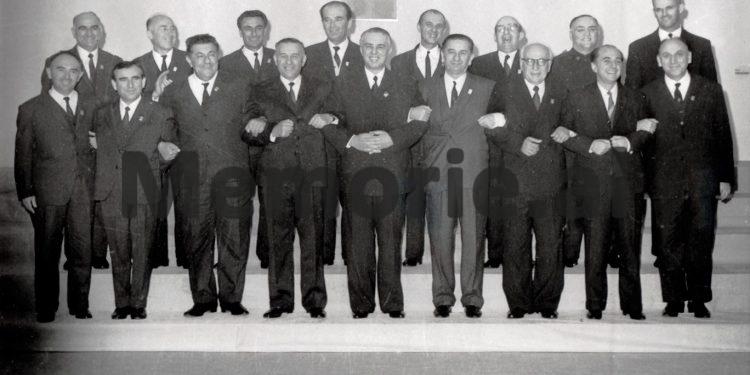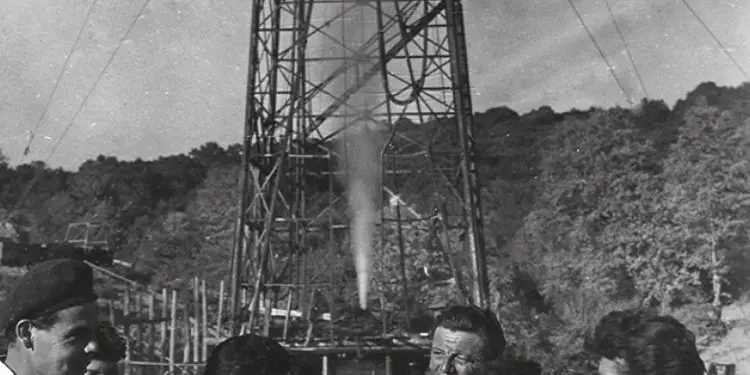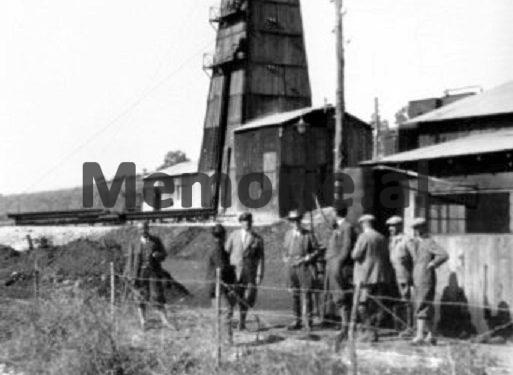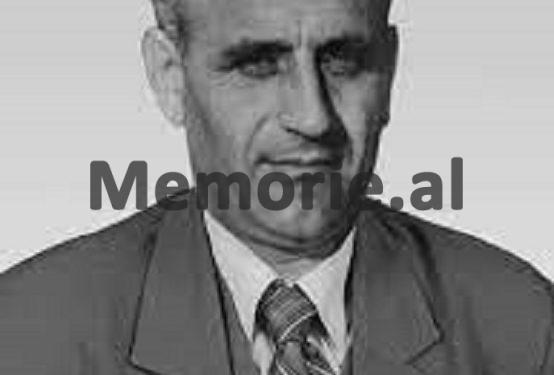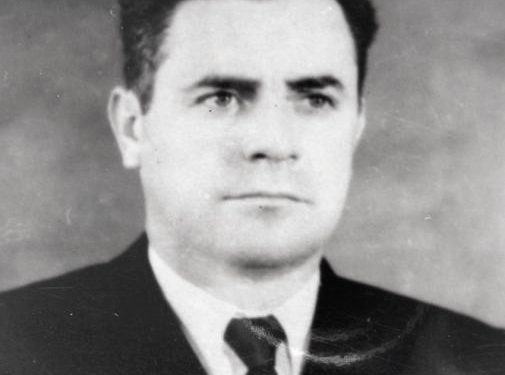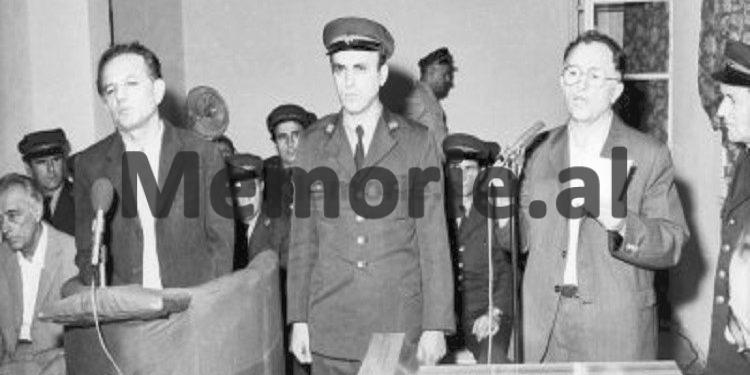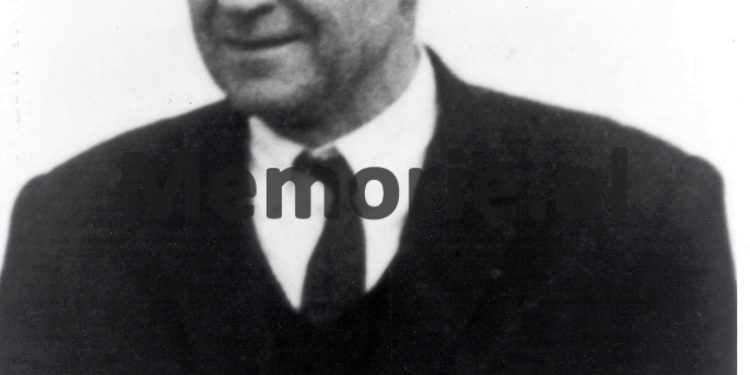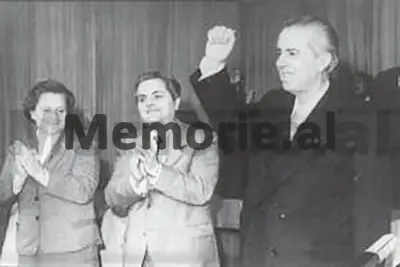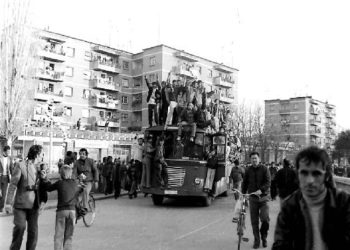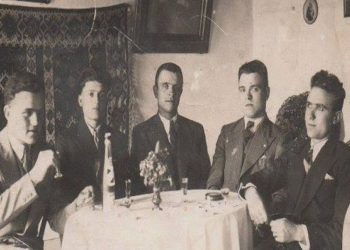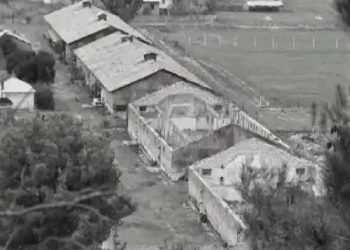Prof. Dr. Fatmir SHEHU
Msc. Ing. Hysen BUNDO
Memorie.al / As is known, in 1975, the Party of Labor of Albania and its leader Enver Hoxha publicly declared that sabotage had occurred in the Oil Industry. This declaration was based on the unsatisfactory results that the Oil and Gas industry had achieved in recent years, both in the field of oil and gas production and especially in the study and research for reserves of these energy sources, which were later materialized with the discovery of new fields. In this context, the concern was related to the fact that the state plans officially approved for the production of oil and gas were not being realized. As a result, new oil and gas fields were not being discovered, according to the tasks set in the state economic plans. This undermined the normal development of the economy, as oil was the Achilles’ heel of the economy at the time, viewed not only as an economic issue but also as a political and ideological one!
Following this declaration, the Party and State organs, such as the Central Committee of the Party and other state bodies, including the Ministry of Internal Affairs, State Security, Prosecutor’s Office, and Courts, organized work to take the necessary measures. Primarily, they sought to document this hostile activity through the study of documents. This sabotaging and hostile activity, as deemed by Enver Hoxha, was pre-defined, even with specific names, during the Plenary of the Central Committee held specifically for this purpose. In his speech at this plenum, which was considered a final conclusion, Enver Hoxha called for further actions to uncover the activities of this hostile group, as outlined in the speech.
On March 24, 1975, a Party meeting was organized to discuss the hostile work in the oil and gas sector, led by the Secretary of the Central Committee of the Albanian Party of Labor, Haki Toska. This meeting was held at the Palace of Culture in Patos, attended by a number of oil workers, including the authors of this writing. Present at this meeting were the First Secretaries of the Party Committees of the districts engaged in Oil Industry activity, as well as representatives from various ministries, State Security, and representatives from the Special Branch (for oil) of the Ministry of Internal Affairs in Fier that covered the Oil Industry, etc.
This meeting was specifically organized to discuss the “hostile activity of the oil sabotage group,” which had already been classified as such by Enver Hoxha himself. The individuals labeled as “Hostile Group” were invited to attend this meeting, even to participate in discussions, but in the end, many were arrested as a result of this gathering. This group included: Lipe Nashi (former General Director of the General Directorate of Oil and Gas, based in Fier, with work experience in the Oil and Gas Industry, educated at the Party School in Moscow, an adept and capable organizational leader), Beqir Alija (geologist, graduated from the former USSR, former Director of the Oil Institute in Fier, married to a Soviet woman).
Koço Plaku (Geologist, graduated in the former USSR, worked at the Institute of Oil in Fier and brother of General Panajot Plaku, who had defected to the former Yugoslavia), Milto Gjikopulli (Geologist, studied at the State University of Tirana, Head of the Generalizations Sector at the Institute of Oil in Fier, a quite skilled specialist), Protoko Murati (Geologist, studied at the State University of Tirana, Head of the Geology Sector at the Institute of Oil in Fier), and Jani Konomi (Oil Production Engineer, studied at the Institute of Oil in Bucharest, Chief Engineer of the Oil Extraction Enterprise in Ballsh).
At that time, there was a conveyor of arrests and sentences. It began with Ing. Nuredin Skrapari, a geologist, continued with the group of Lipe Nashi, who were arrested within the framework of the oil activity on March 27, 1975, and further continued with the arrest of Jani Konomi (Oil Production Engineer, studied at the Institute of Oil in Bucharest, Chief Engineer of the Oil Extraction Enterprise in Ballsh) and Dhimitër Stefa (Geologist, graduated in Romania) on April 18, 1975. After them, Abdyl Këllezi (Chairman of the State Planning Commission and member of the Political Bureau of the PPSH), and Koço Theodhosi (Minister of Industry and Mines, member of the Political Bureau, high-level specialist: chemist graduated in France) were arrested and sentenced to death. This meeting took place from March 24-27, 1975. On the last day, they were arrested in front of all attendees.
The meeting was attended and led by Haki Toska, a member of the Political Bureau and Secretary of the Central Committee of the PPSH, etc. In the presidium of the meeting was also Geologist Kadri Rama (who was arrested shortly after and sentenced to 24 years in prison, accused of sabotage) and Jorgo Varfi (medium technician in oil production). Varfi had sent a letter to Enver Hoxha, raising the concern that “sabotage and hostile activities are occurring in the Oil Industry.” The letter can be considered, in our opinion, as the beginning of this reprisal that took place in the Oil Industry at that time.
At that meeting, in the front row of the hall, were also present other authorities of the country such as Koço Theodhosi (former Minister of Industry and Mines, who was soon sentenced to death, accused of sabotage and hostile work) and Piro Gusho, former First Secretary of the Party Committee of the Fier District (who, shortly after the conclusion of the oil activity, under pressure during a Party analysis in Fier, held at the Officers’ House, went home during a break in the meeting and committed suicide), etc.
The atmosphere was tense at the meeting!
When the analysis of the “Hostile Group” of Lipe Nashi took place, the atmosphere was very heated and tense. The analysis was held in a large setting filled with numerous people in the hall of the Palace of Culture in Patos. The hall was filled with representatives of workers from the Oil Sector, as well as various specialists. The analysis was led by a presidium, headed by Haki Toska, a member of the Political Bureau and Secretary of the Central Committee of the PPSH; a person chosen to represent the authority of the party. It was a very heavy psychological pressure that loomed over all the oil specialists.
The discussions were prepared in support of Enver Hoxha and the PPSH and contained harsh criticisms of those who were labeled as “saboteurs and enemies.” On the last day of the meeting, the accused were called one by one and delivered their speeches, making profound self-criticism. However, their discussions were interrupted by a voice (shout) from the back of the hall: “Arrest them, we have nothing to hear from these enemies and saboteurs.” Certainly, the one who spoke was instructed and deliberately placed by State Security to make such a call. The main accused were Lipe Nashi, Beqir Alija, Koço Plaku, Milto Gjikopulli, etc. We all knew them very well; in fact, we had a close relationship with Milto Gjikopulli and Koço Plaku.
But we were not distant with the others either, as work connected us. It was a very strange scenario! Some of them had just been decorated with the highest award: “Hero of Socialist Labor,” as had been awarded to Lipe Nashi, and within a very short period, they were accused of sabotage and hostile activity! Sometime after the arrest of the so-called “hostile group,” we were summoned by the Ministry of Internal Affairs, in groups, and tasked with analyzing and examining the “hostile activity” of Lipe Nashi’s group.
Several working groups were assigned to conduct this analysis and examination, such as: “The Geology Group,” “The Oil Production Group,” “The Deep Well Drilling Group for Oil and Gas,” “The Backstage Group,” etc. To align with the political perspective, we familiarized ourselves with the materials of the Central Committee of the PPSH, especially with the speeches of Enver Hoxha and Mehmet Shehu, in the recent plenum of the Central Committee and other political materials. The heads of the groups were summoned to Tirana, to the Central Committee, and were given “Top Secret” material concerning the issue of the “group of saboteurs” that had been arrested.
The examination of documents…
We spent a considerable amount of time examining the documents as well as the accusations made against them in general, or the accusations made by “the working class” in the analyses that were conducted throughout the oil industry, in various organizations, where the main analysis was done in the basic party organizations of each unit. The main base material for us as part of the Expert Group was Enver Hoxha’s speech, which had already become an indictment against this group. In this context, we were obligated to adhere to this accusation because we were not allowed to conduct our examination and identify the relevant issues, and then Enver Hoxha would speak to give the conclusions; the opposite happened instead!
As an expert group, we were now facing a dangerous boundary, either to cross or break the words spoken by Enver Hoxha. From May 4, 1975, to September 1, 1975, we were detached from work to work in the Government Commission for identifying the “hostile work in the oil industry by Lipe Nashi’s group.” We, the authors of this writing, were appointed members of the group for the Sector of Drilling Industry. This group included: Engineer Fatmir Shehu – Group Chairman, Drilling Engineer; Engineer Hysen Bundo, Drilling Engineer; Engineer Elmaz Leka, Drilling Engineer; Economist Genci Xhuvani (the son of Prof. Dr. Aleksandër Xhuvani and brother-in-law of Ramiz Alia, an economist and a very noble and knowledgeable man); and a mechanical engineer, Engineer Arif Gjata, a well-prepared and noble individual.
This group also included Sulo Kamberi, an experienced well supervisor, in the capacity of a representative of the working class. Our analysis began by detaching us from work, and we were authorized to take any document that we deemed necessary within the framework of this expertise. On the first day after our formation as a sector group for drilling, we were summoned and met with the Deputy Minister of Internal Affairs, Feçor Shehu, who oriented us on our assigned task. The General Directorate of Oil and Gas was immediately dissolved with the arrest of Lipe Nashi, and all documents were blocked. Following this dissolution, Engineer Hysni Frakulla, former Secretary of the Party Committee of Patos, was appointed as the plenipotentiary director for the temporary administration of the General Directorate of Oil in Fier.
Certainly, our group, like the other groups, was created after everything had become a fact from the highest authority in the country – Enver Hoxha. He issued an official document that directly accused and categorized this group as “hostile and sabotaging.” Thus, the accused were arrested and charged with hostile activities, by Enver Hoxha himself; our expertise was formal and compelled to be political, rather than a real economic-technical-scientific analysis. As a result, we were in a very difficult situation because everything was bound by ideological and political boundaries. As a group of experts, we could not make any other argument except to support the political conclusions drawn by Enver Hoxha, based on which the group had been arrested.
Our drilling expert group, in fact, had no connection with any of the arrested or accused of hostile work. However, State Security often “consulted” us and guided us that even in the drilling industry, despite the fact that no person had been arrested along with the so-called hostile group of Lipe Nashi, there was much room for in-depth analyses! According to them, even in the drilling industry, there had been sabotage work because there had been breakdowns that had severely damaged the economy, and the party urged: “Let us fight the concepts that: there is no drilling without breakages, that drilling cannot be done without breakages, that breakages are like crumbs when eating bread,” etc.
Our conclusions as experts…
As a group, we were very convinced and argued that the breakdowns that occurred were not due to specific individuals’ faults, but rather due to certain technical and technological causes. In fact, in the drilling sector, numerous studies and applications had been made that had solved difficult problems which even Soviet specialists, during their work, had been unable to overcome when faced with them. Our group insisted on arguing the possibility of sabotage, particularly regarding the drowning of the productive layer and as a pretext, they brought up the use of barite, which was successfully used to withstand abnormally high pressures, and later, the use of rice husk, which was effectively used against circulation losses. We argued that the use of barite is a technological necessity, present in the global drilling practices, especially in layers containing fluids that have high pressure.
We argued through the studies we had conducted that in our drilling practice, we encountered layers with pressure gradients above 2.1-2.2 atm /10 meters, which necessitated the use of barite and other weighting agents. During our work in the context of the expertise, from time to time, especially the group leaders were summoned individually by the Ministry of Internal Affairs, such as the then Deputy Minister, Feçor Shehu, or by the General Directorate of Security, seeking consultation from many experts who had been engaged in this work from both institutions. The Expert Group of the Drilling Industry had no arrested or imprisoned individuals from this sector within the group, nor were there concrete confrontations, as there were for the Expert Group in Geology and Oil Extraction, with the arrested individuals during inquiries or the development of trials.
This expertise lasted from May 4, 1975, to September 1, 1975, and to be honest, we found no highlighted elements that would substantiate the hostile work of this group, especially in the field of drilling. As an expert group, we could not oppose the analyses and denunciations made by the state structures and personally by Enver Hoxha, before the formation and commencement of work of the expert group. Therefore, we did not aim to contest the political content of this issue because we knew what awaited us! The most straightforward path, we believe, would have been that before being accused and arrested and sentenced, a documented expertise should have been performed by technical and economic experts. Only later, when facts were found, should accusations of sabotage have emerged. In our judgement, this would have been the right path and not the opposite, as it happened, where “the cart was placed in front of the horse.” Although our group maintained the political ethics of the “assessment” of the accusations made by Enver Hoxha himself regarding “sabotage in oil,” before we were formed as an Expert Group, we unanimously managed, with very detailed arguments, to prevent imprisonment or harsher sentences for any of the leaders of the time who had worked in the oil drilling industry.
In fact, during that time, six drilling enterprises operated in the drilling industry, with about 70 rigs, with drilling capacities of up to 6,700 m, and there was significant activity, as approximately 300,000 linear meters of drilling were realized annually. During work, for various reasons, various types of breakdowns also occurred, even uncontrolled blowouts (gas eruptions), which were generally due to a lack of accurate knowledge of geological cutting (especially in exploratory wells). This also happened due to violations of technical discipline and work protocols during the drilling processes.
Our balance of analysis was a success for our expert group in the drilling industry, as we were under pressure to definitely uncover “hostile and sabotaging activities” in this sector. Thus, while in the geology sector there were two executions and other severe sentences, as well as in the oil and gas production industry, there were severe sentences, in the drilling industry, there was only one sentence, which was the expulsion from the party of Prof. Ramadan Perhati and his assignment for re-education in the ranks of the working class. He was expelled from the Party, as it was declared, for “a concealment in his autobiography.” This sentence was issued by the structures associated with the party organization to which he belonged. The condemned one was not recommended by our expertise! In fact, in our expertise, his name was never mentioned.
We in the group were very convinced and had argued that the breakdowns that occurred were not due to the concrete faults of individuals, but rather due to certain technical and technological reasons. In fact, in the drilling sector, there were numerous studies and applications that had solved difficult problems that even Soviet specialists, when faced with them during their work, had been unable to overcome. In our direction as a group, there was great insistence on arguing the possibility of sabotage, primarily concerning the drowning of the productive layer and, as a pretext, the use of barite, which was successfully used to withstand abnormally high pressures, and later the use of rice husk, which was successfully used against circulation losses. We argued that the use of barite was a technological necessity present in all global drilling practices, especially in layers containing fluids with high pressure.
We argued through the studies we had conducted that in our drilling practice, we encountered layers with pressure gradients above 2.1-2.2 atm /10 meters, which necessitated the use of barite and other weighting agents. During our work in the context of the expertise, the group leaders were from time to time summoned individually by the Ministry of Internal Affairs, such as the then Deputy Minister Feçor Shehu, or by the General Directorate of Security, seeking consultation from many experts who had been engaged in this work from both institutions. The Expert Group of the Drilling Industry had no arrested or imprisoned individuals from this sector within the group, nor were there concrete confrontations, as there were for the Expert Group in Geology and Oil Extraction, with the arrested individuals during inquiries or the development of trials.
This expertise lasted from May 4, 1975, to September 1, 1975, and to be honest, we found no clearly stated elements that would substantiate the hostile work of this group, especially in the field of drilling. As an expert group, we could not oppose the analyses and denunciations made by the state structures and personally by Enver Hoxha before the formation and commencement of work of the expert group. Therefore, we did not aim to contest the political content of this issue because we knew what awaited us! The most straightforward path, we believe, would have been that before being accused and arrested and sentenced, a documented expertise should have been performed by technical and economic experts. Only later, when facts were identified, should accusations of sabotage have emerged. In our judgement, this would have been the right path and not the opposite, as it happened, where “the cart was placed in front of the horse.”
Although our group maintained the political ethics of the “assessment” of the accusations made by Enver Hoxha regarding “sabotage in oil,” before we were formed as an Expert Group, we unanimously managed, with very detailed arguments, to prevent imprisonment or harsher sentences for any of the leaders of the time who had worked in the oil drilling industry. In fact, at that time, six drilling enterprises operated in the drilling industry, with about 70 rigs, with drilling capacities of up to 6,700 m, and there was significant activity, as approximately 300,000 linear meters of drilling were realized annually. During work, for various reasons, various types of breakdowns also occurred, even uncontrolled blowouts (gas eruptions), which were generally due to a lack of accurate knowledge of geological cutting (especially in exploratory wells). This also happened due to violations of technical discipline and work protocols during the drilling processes.
Our analysis balance was a success for our expert group in the drilling industry, as we were under pressure to definitely uncover “hostile and sabotaging activities” in this sector. Thus, while in the geology sector there were two executions and other severe sentences, as well as in the oil and gas production industry, there were severe sentences, in the drilling industry, there was only one sentence, which was the expulsion from the party of Prof. Ramadan Perhati and his assignment for re-education in the ranks of the working class. He was expelled from the Party, as it was declared, for “a concealment in his autobiography.” This sentence was issued by the structures associated with the party organization to which he belonged. The condemned one was not recommended by our expertise! In fact, in our expertise, his name was never mentioned.
After these sentences, no one, regardless of their position at work, felt safe for the next day. Can work be done in fear?! Together with the entire expert group in the drilling industry, we worked under the paradigm: “Control and Balance”! Nevertheless, we seek forgiveness and apologize for any unjust stance, for self-defense reasons, however insignificant and minor it may be, that we were forced to adopt for political reasons, which may have influenced even slightly, due to our expertise, the sentencing of the accused. We were not decision-makers; the investigators and justice experts had the final say.
After Lipe Nashi was released from prison, with whom I certainly knew very well personally, and who was a close friend of mine since he had been a partisan with my maternal uncles and grandfather, from Toçi of Tepelena (the Xhemalaj family), I happened to meet him in Saranda, and we had a coffee together. I asked him for this forgiveness face to face, and he said to me: “Fatmir, you were at the edge of the blade yourself, because we were sentenced before your expertise, and if you had defended us (even though we didn’t hear any accusations from you!), you would have added to the ranks of the group that was arrested, with me at the head!” /Memorie.al




